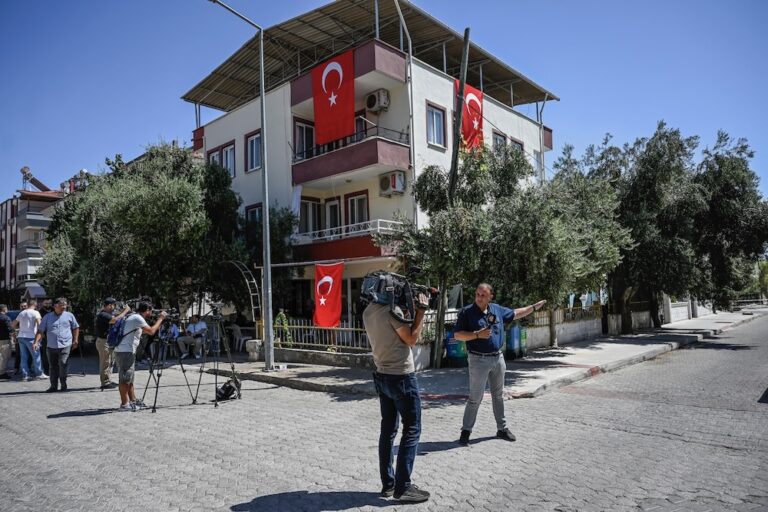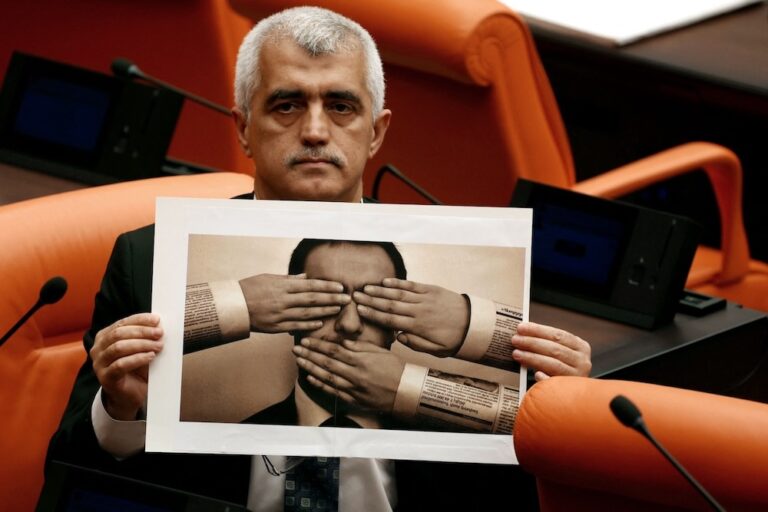(Index on Censorship/IFEX) – Turkish journalist Nadire Mater’s court battle over her groundbreaking book of interviews with veterans of the country’s southeastern war took a turn for the worse in July. Prosecutors called for Mater to be jailed for up to twelve years for “insulting and belittling” the military, arguing that the book lacked “objectivity” […]
(Index on Censorship/IFEX) – Turkish journalist Nadire Mater’s court battle over her groundbreaking book of interviews with veterans of the country’s southeastern war took a turn for the worse in July.
Prosecutors called for Mater to be jailed for up to twelve years for “insulting and belittling” the military, arguing that the book lacked “objectivity” and embodied a “western tradition going back to Ottoman times” of slandering the Turks.
The renewed call for a heavy jail sentence came after the prosecutors rejected an independent report commissioned by the court to assess whether the book broke Article 159 of the Turkish penal code on representing the military.
Expert Professor Koksal Bayraktar found in favour of Mater in his report, submitted at a 7 July 2000 hearing, the sixth since June 1999. Bayraktar said the “charges against Mater were inappropriate,” and that the book in fact aimed to be an “objective evaluation of the south-east conflict.”
But the prosecutor rejected his finding.
“(Bayraktar’s) report is contradictory,” he said. “The specialist’s view that the book is objective is contradicted by the fact that it excludes (balancing) interviews with the relatives of the victims of massacres of civilians – mostly women and children –
in villages in the south-east.”
Turkish security forces have been warring with the guerrillas of the Kurdish Workers Party (PKK) in the mainly-Kurdish minority populated southeast since 1984. Tens of thousands of civilians have died and more than a million people have been displaced.
Mater is a highly regarded media rights campaigner as well as a journalist. Her work with the European Parliament and as Turkish representative of Reporters sans frontières has often drawn fire. As a freelance correspondent for Inter Press Service, her accounts of Turkish rights abuses are widely read internationally.
As a result, her plight has been highlighted by several of Turkey’s political/military allies, including U.S. Secretary of State Madeleine Albright. The book is being translated into Greek and German and other international editions are in hand.
Only three days before, Mater had been among twenty-two journalists honoured with Human Rights Watch Hellman/Hammett annual awards for writers around the world who have been targets of political persecution.
Mater is also playing a leading role in a major European Union (EU) funded media rights project due to begin this year after three yearsâ preparation. The restriction on freedom of expression is one of the issues delaying negotiations on Turkey’s possible membership in the EU.
Perhaps with all this in mind, the prosecutor sharply described the “criticisms” in the book as a “western tradition going back to Ottoman times” to undermine the Turkish authorities’ efforts to defend their country by bringing irrelevant charges against its security forces.
Turkey’s most prominent writers have rallied behind Mater and published a joint declaration of solidarity, urging the authorities to “correct this grave mistake”. The signatories include Turkey’s two best-known authors, Yasar Kemal and Orhan Pamuk.
The best-selling collection of interviews, called “Mehmedin Kitabi” (Mehmet’s Book), give the accounts of forty-two soldiers and some of their families and their experiences, during the fighting in Turkey’s disputed southeastern provinces.
The book had gone to its third and fourth reprints before the army pressed the public prosecutors to charge Mater and publisher, Semih Sokmen, of Metis Books, who faces a heavy fine.
Ironically, prosecution for the first and second editions is blocked by a partial “amnesty” for such crimes committed before May 1999, introduced by the government in an effort to be seen to be cleaning up Turkey’s human rights record and meet EU demands.
The book sold an estimated 15,000 copies before last year’s ban, but as many as 40 to 50,000 copies may be in distribution. It has been illegally reprinted and distributed and original copies were still on sale in Turkish street markets the weekend before Mater’s latest hearing.
Mater, Sokmen, and their lawyers have accepted Bayraktar’s report and have pleaded not guilty. Beyoglu District Penal Court No. 2 is expected to make a final decision after Mater and Sokmen make present their defence at the next hearing on 24 August.
In a related development, Guler Yildiz, a reporter for the local newspaper “Cinar”, in Turkey’s southern province of Mersin, has also been charged with insulting the military under Article 159 of the Turkish penal code after quoting passages from Mater’s book in an article.
See also:
http://www.clark.net/kurd/Zagros/Gunter3.html
http://www.dfn.org/Voices/Mideast/turkey/materintro.htm
http://www.indexoncensorship.org/news/turkey081099.html
Nadire Mater can be contacted at:
Nadire Mater
C/o IPS
Kallavi Sokak. 56/7
80050 Beyoglu
Istanbul, Turkey
Tel: +90 212 245 6185/6
Fax: +90 212 245 2824
Mobile: +90 532 231 3836


